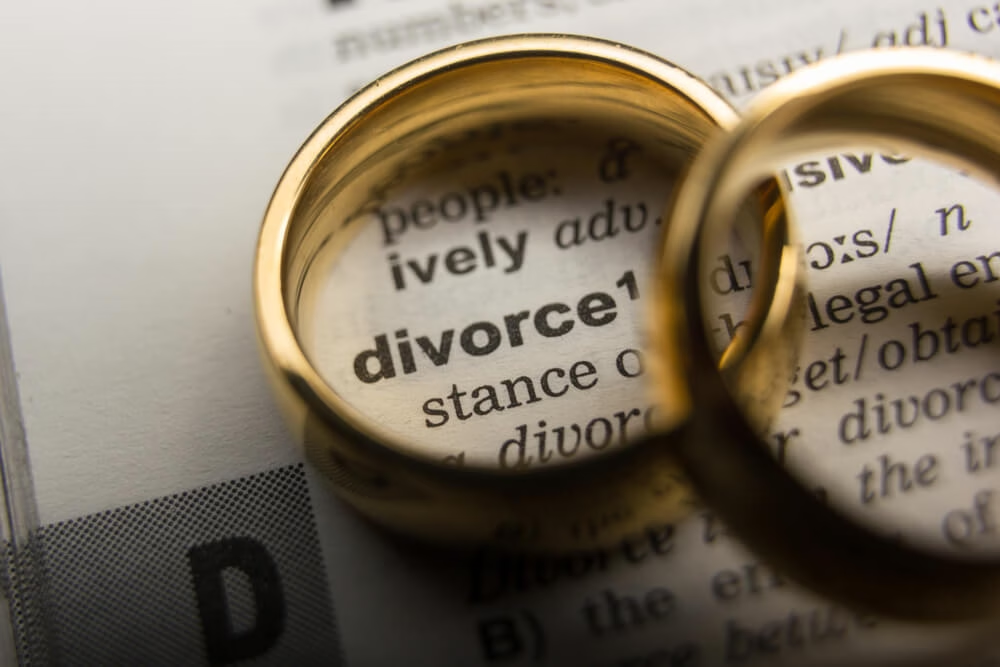Divorce is an emotionally and legally significant time, but with the right support, it does not need to be contentious or confusing. Our Divorce solicitors have specialist experience of helping thousands of people through the process.
What is Divorce in Legal Terms?
A divorce is the process which ends the legal relationship which was formed when people get married. The process starts with an application, which can be made by either party to the marriage or both. The divorce process ends with a final order.
There are often additional considerations when a divorce happens, such as how the family’s wealth will be distributed and where any children of the family will live.
The process is often emotionally challenging for all parties involved, which is where an expert Divorce solicitor can help you through the legal process.
Related Family Law Services:
What to Expect From Our Divorce Solicitors?
Our experienced, specialist solicitors are experts in their field and the large team at TV Edwards is nationally renowned for excellence in family law.
We will meet with you and talk to you about your situation, your aims and your priorities. You will always be at the centre of your case. We will advise you in a straightforward and clear manner and plan a personalised strategy to solve your legal problem. We will then work with absolute dedication to bring about that resolution.
You can expect our solicitors to provide a kind and empathetic approach by listening to and understanding your needs every step of the way.
Why Choose TV Edwards?
Our specialist family team is top ranked in Chambers UK and highly commended in the Legal 500 2025 legal directories. The department has been recognised in The Times as a top 20 firm for family law in their 2025 and 2026 guide.
Having a large team of dedicated and specialist solicitors means that we can advise in a wide range of family cases, including divorce, finances and children. Our specialist expert divorce solicitors handle complex cases with significant assets. Our specialist children lawyers are often at the forefront of family law handling groundbreaking cases in the high court and court of appeal.
We are passionate about the work do and are committed to provide exceptional client service to get you the best possible outcome in often stressful circumstances.
Client Testimonials
Contact Us
Divorce Law Frequently Asked Questions
What Are The Grounds For Divorce?
There is only one ground for divorce, that is that the marriage has irretrievably broken down. It is no longer necessary to cite reasons for the divorce as we now have a “no fault” divorce process.
When Should I Contact A Divorce Lawyer?
It may assist you to speak with divorce lawyer if you are considering separation so that you can be prepared for the process in advance. In either you or your spouse declare an intention to divorce, you should speak with a divorce lawyer so you are empowered with an understanding of the process and what divorce involves.
How Does The Divorce Process Start?
A divorce is started by an application being submitted to the court. This can be done by one party to the marriage or both jointly. The decision on whether to apply solely or jointly is made at the start of the process. If it is decided that one of the parties will be the sole applicant, this cannot change to a joint application later. The application states that the marriage has irretrievably broken down
How Long Does A Divorce Take?
After submitting the divorce application the law provides for a “period of reflection” which is a minimum of 20 weeks. After that, the applicant(s) notify the court that they still want to go ahead with the divorce and the conditional order is made. Six weeks later, they can apply for the conditional order to be made into a final divorce order. Therefore, it is a minimum of 26 weeks, six months, from start to finish.
Depending on financial arrangements, it may be necessary or sensible to wait to apply for the final divorce order.
Do I Need My Marriage Certificate To Get Divorced?
Yes, you are required to submit your marriage certificate to the court with your application for a divorce. The marriage certificate also contains information that is needed to draft the divorce application.
In most cases, the marriage certificate is scanned in to be sent electronically through the digital application process. The scanned copy must be of the original marriage certificate or a formal certified copy. If you have lost your certificate, or you do not have it in your possession, then you can apply for a further copy for a small fee at the General Register Office or sometimes the venue where the marriage took place.
If you are required to send a hard copy of the marriage certificate, be aware that the court will retain it.
What is a Clean Break Agreement?
A Clean Break Agreement is a legal court order that ends all financial ties between a couple during divorce. This order prevents any legal claims to be made against each other
I Was Married Abroad and My Marriage Certificate is Not in English, Does This Matter?
You will need to obtain a formal translation of the certificate and a “certificate of translation” for the court. As stated, the marriage certificate will also contain important information that is needed to complete the divorce petition, which will have to be prepared in English.
The court will only accept translations that have been carried out in accordance with the family court rules and certified by a translator. Therefore legal advice is required to make sure the requirements are satisfied.
Can I Name The Party in the Divorce Petition That my Spouse Was Adulterous With?
This is no longer possible. While some people feel that the reason a marriage broke down, including infidelity, should dictate the basis for a divorce, the changes brought in now exclude this. This is in favour of a neutral statement that the relationship has broken down, in the hope that this will allow a constructive and non-confrontational end to the marriage.
What Happens if my Ex Defends the Divorce?
Only a tiny number of divorces are defended since the changes made on 6 April 2022. It is not possible to defend a divorce because one party does not wish to separate.
Now, one party can only try to stop a divorce if:
-
- At the time of the marriage there was fraud or other procedural issues
-
- There is another country that should be deciding the divorce rather than England and Wales
-
- The marriage is not valid or has already been dissolved
-
- At the time of the marriage there was fraud or other procedural issues
Can I Defend the Divorce Petition my Ex Has Put in to Court?
If you think your circumstances might fall into the narrow areas for defending a divorce, then we can advise on whether the court is likely to agree with you. The procedure to defend a divorce is fairly complicated
My Ex Won’t Confirm That They’ve Received the Divorce Papers. What Should I Do?
In the case of a sole applicant, the other party is known as a respondent. The court writes to the respondent letting them know that the divorce application has been issued and sending them a link to the digital portal where they are to complete the acknowledgement of service form. If the sole applicant does not have a postal address for the respondent, but has an email address, an application can be made to the court for permission to notify the respondent of the divorce by email only.
If the respondent does not complete the acknowledgement of service form, the court will accept lots of different types of evidence that they have had the divorce application even though they have not returned the necessary form to say so. Failing that, we can arrange for them to be handed the documents personally by a Process Server.
The court should then be satisfied by that Process Server’s evidence that the respondent knows about the divorce, and the application would be allowed to proceed. There are other routes too depending on your circumstances, so it is important not to panic.
Is The Process Different For Same-Sex Marriages Or Civil Partnerships?
With the advent of the Divorce, Dissolution and Separation Act 2020, the procedure for divorce and dissolution is exactly the same for same-sex marriages and civil partnerships.
What Are The Costs of Divorce?
The cost will depend upon the level of agreement between the parties about arrangements for the divorce. In addition to our fees, the court charges a fee for processing the case, which is currently £593. The cost of a solicitor will be in addition to the court fee.
What Difference Does it Make to Have a Lawyer Who is a Resolution Member Acting For me in my Divorce?
Resolution is an organisation that most family lawyers belong to. All divorce solicitors at TV Edwards are members. We are committed to constructive dealings to minimise the emotional and financial cost of a divorce and related issues.
This does not mean we do not protect your interests robustly, but the idea is that letters and documents will be considerately worded and take into account the long-term effects of what is done and said at the time of separation.
This is especially important where there are children, as a divorcing couple will Continue to be the parents of their children and that means that some form of continuing cooperation is important.
Does Divorce Decide Where Our Children Live?
No. The court does not have to decide where your children live or who they spend time with in order for your divorce to be finalised. The vast majority of separating parents decide between themselves how their children should divide their time without recourse to anyone else.
In those circumstances, no child arrangement order is made governing the children’s time. If parents cannot agree, then one of them can apply to the court for a judge to make a decision, although we encourage parents to try mediation or negotiation supported by solicitors before applying to the court, which should be considered a last resort. In any case, the divorce procedure is entirely separate.
How Are Financial Claims Dealt With During Divorce?
Ending a marriage or civil partnership does not automatically deal with the financial claims that both parties have against each other. Financial claims can be made by either party over matrimonial assets whether held in joint names or in one party’s sole name and the court can make a range of orders to divide those assets. The court also has the power to make orders relating to maintenance and pensions.
Financial claims can only be finalised by way of a court order, either one made by the court of its own volition or by approving an agreement reached between the parties. Up to, and until, an order is made, it is possible for either party to make a claim against the assets of the other party, even many years after the divorce has been finalised.
What Happens To Assets During A Divorce?
Any assets will be divided on the basis of fairness – where the court will look at financial needs, whether sharing is appropriate and to a much lesser extent, contributions. The court’s paramount concern will be any children of the family.
Can We Convert Our Civil Partnership Into A Marriage?
Couples who registered a civil partnership in England and Wales have been able to convert this to marriage since 10 December 2014. Couples can hold a ceremony or have a simple conversion at a register office and obtain a marriage certificate which is backdated to the date of the civil partnership. No involvement from lawyers is required. We understand why many couples wish to convert, although the legal protections marriage provides are the same as civil partnerships and therefore the benefit in converting is personal rather than legal.












